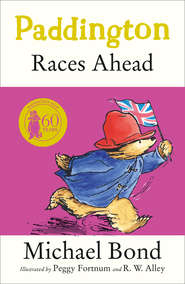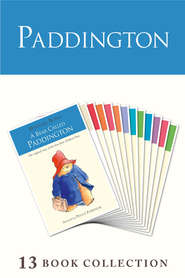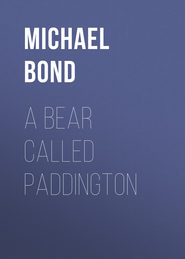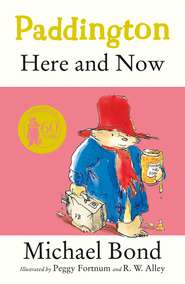По всем вопросам обращайтесь на: info@litportal.ru
(©) 2003-2024.
✖
Paddington Novels 1-3
Настройки чтения
Размер шрифта
Высота строк
Поля
He climbed up on to a stool by the window and looked out. There was a large, interesting garden below, with a small pond and several trees which looked good for climbing. Beyond the trees he could see some more houses stretching away into the distance. He decided it must be wonderful living in a house like this all the time. He stayed where he was, thinking about it, until the window became steamed up and he couldn’t see out any more. Then he tried writing his name on the cloudy part with his paws. He began to wish it wasn’t quite so long, as he soon ran out of cloud and it was rather difficult to spell.
“All the same” – he climbed on to the dressing-table and looked at himself in the mirror – “it’s a very important name. And I don’t expect there are many bears in the world called Paddington!”
If he’d only known, Judy was saying exactly the same thing to Mr Brown at that very moment. The Browns were holding a council of war in the dining-room, and Mr Brown was fighting a losing battle. It had been Judy’s idea in the first place to keep Paddington. In this she not only had Jonathan on her side but also her mother. Jonathan had yet to meet Paddington but the idea of having a bear in the family appealed to him. It sounded very important.
“After all, Henry,” argued Mrs Brown, “you can’t turn him out now. It wouldn’t be right.”
Mr Brown sighed. He knew when he was beaten. It wasn’t that he didn’t like the idea of keeping Paddington. Secretly he was just as keen as anyone. But as head of the Brown household he felt he ought to consider the matter from every angle.
“I’m sure we ought to report the matter to someone first,” he said.
“I don’t see why, Dad,” cried Jonathan. “Besides, he might get arrested for being a stowaway if we do that.”
Mrs Brown put down her knitting. “Jonathan’s right, Henry. We can’t let that happen. It’s not as if he’s done anything wrong. I’m sure he didn’t harm anyone travelling in a lifeboat like that.”
“Then there’s the question of pocket money,” said Mr Brown, weakening. “I’m not sure how much pocket money to give a bear.”
“He can have a pound a week, the same as the other children,” replied Mrs Brown.
Mr Brown lit his pipe carefully before replying.
“Well,” he said, “we’ll have to see what Mrs Bird has to say about it first, of course.”
There was a triumphant chorus from the rest of the family.
“You’d better ask her then,” said Mrs Brown, when the noise had died down. “It was your idea.”
Mr Brown coughed. He was a little bit afraid of Mrs Bird and he wasn’t at all sure how she would take it. He was about to suggest they left it for a little while when the door opened and Mrs Bird herself came in with the tea things. She paused for a moment and looked round at the sea of expectant faces.
“I suppose,” she said, “you want to tell me you’ve decided to keep that young Paddington.”
“May we, Mrs Bird?” pleaded Judy. “Please! I’m sure he’ll be very good.”
“Humph!” Mrs Bird put the tray down on the table. “That remains to be seen. Different people have different ideas about being good. All the same,” she hesitated at the door, “he looks the sort of bear that means well.”
“Then you don’t mind, Mrs Bird?” Mr Brown asked her.
Mrs Bird thought for a moment. “No. No, I don’t mind at all. I’ve always had a soft spot for bears myself. It’ll be nice to have one about the house.”
“Well,” gasped Mrs Brown, as the door closed. “Whoever would have thought it!”
“I expect it was because he raised his hat,” said Judy. “It made a good impression. Mrs Bird likes polite people.”
Mrs Brown picked up her knitting again. “I suppose someone ought to write and tell his Aunt Lucy. I’m sure she’d like to know he’s safe.” She turned to Judy. “Perhaps it would be a nice thought if you and Jonathan wrote.”
“By the way,” said Mr Brown, “come to think of it, where is Paddington? He’s not still up in his room, is he?”
Judy looked up from the writing-desk, where she was searching for some notepaper. “Oh, he’s all right. He’s just having a bath.”
“A bath!” Mrs Brown’s face took on a worried expression. “He’s rather small to be having a bath all by himself.”
“Don’t fuss so, Mary,” grumbled Mr Brown, settling himself down in the armchair with a newspaper. “He’s probably having the time of his life.”
Mr Brown was fairly near the truth when he said Paddington was probably having the time of his life. Unfortunately it wasn’t in quite the way he meant it. Blissfully unaware that his fate was being decided, Paddington was sitting in the middle of the bathroom floor drawing a map of South America with a tube of Mr Brown’s shaving cream.
Paddington liked geography. At least, he liked his sort of geography, which meant seeing strange places and new people. Before he left South America on his long journey to England, his Aunt Lucy, who was a very wise old bear, had done her best to teach him all she knew. She had told him all about the places he would see on the way and she had spent many long hours reading to him about the people he would meet.
It had been a long journey, half-way round the world, and so Paddington’s map occupied most of the bathroom floor and also used up most of Mr Brown’s shaving cream. With the little that was left he tried writing his new name again. He had several attempts and finally decided on PADINGTUN. It looked most important.
It wasn’t until a trickle of warm water landed on his nose that he realised the bath was full and was beginning to run over the side. With a sigh he climbed up on to the side of the bath, closed his eyes, held his nose with one paw, and jumped. The water was hot and soapy and much deeper than he had expected. In fact, he had to stand on tiptoe even to keep his nose above the surface.
It was then that he had a nasty shock. It’s one thing getting into a bath. It’s quite another getting out, especially when the water comes up to your nose and the sides are slippery and your eyes are full of soap. He couldn’t even see to turn the taps off.
He tried calling out “Help”, first in quite a quiet voice, then very loudly: “HELP! HELP!”
He waited for a few moments but no one came. Suddenly he had an idea. What a good thing he was still wearing his hat! He took it off and began baling out the water.
There were several holes in the hat because it was a very old one that had once belonged to his uncle, but if the water didn’t get much less, at least it didn’t get any more.
“That’s funny,” said Mr Brown, jumping up from his armchair and rubbing his forehead. “I could have sworn I felt a spot of water!”
“Don’t be silly, dear. How could you?” Mrs Brown, busy with her knitting, didn’t even bother to look up.
Mr Brown grunted and returned to his newspaper. He knew he had felt something, but there was no point in arguing. He looked suspiciously at the children, but both Judy and Jonathan were busy writing their letter.
“How much does it cost to send a letter to Lima?” asked Jonathan.
Judy was about to reply when another drop of water fell down from the ceiling, this time right on to the table.
“Oh, gosh!” She jumped to her feet, pulling Jonathan after her. There was an ominous wet patch right over their heads and right underneath the bathroom!
“Where are you going now, dear?” asked Mrs Brown.
“Oh, just upstairs to see how Paddington’s getting on.” Judy pushed Jonathan through the door and shut it quickly behind them.
“Crikey,” said Jonathan. “What’s up?”
“It’s Paddington,” cried Judy over her shoulder as she rushed up the stairs. “I think he’s in trouble!”
She ran along the landing and banged loudly on the bathroom door. “Are you all right, Paddington?” she shouted. “May we come in?”
“HELP! HELP!” shouted Paddington.”Please come in. I think I’m going to drown!”
“Oh, Paddington.” Judy leant over the side of the bath and helped Jonathan lift a dripping and very frightened Paddington on to the floor. “Oh, Paddington! Thank goodness you’re all right!”
Paddington lay on his back in a pool of water. “What a good job I had my hat,” he panted. “Aunt Lucy told me never to be without it.”
“But why on earth didn’t you pull the plug out, you silly?” said Judy.












